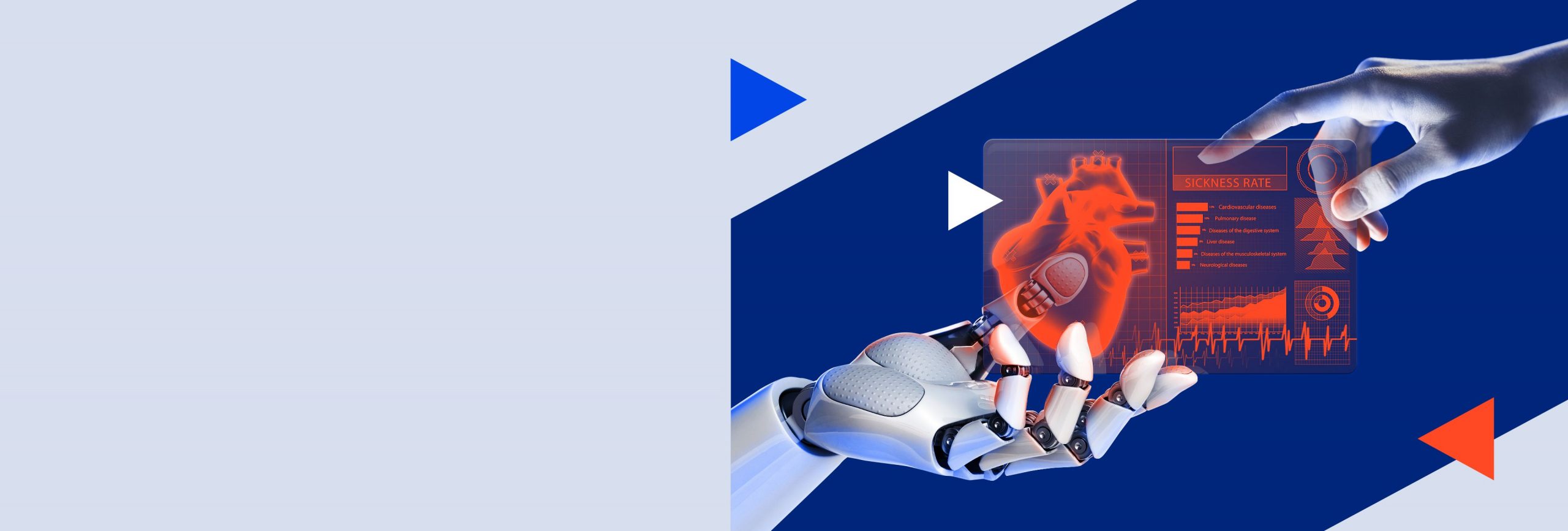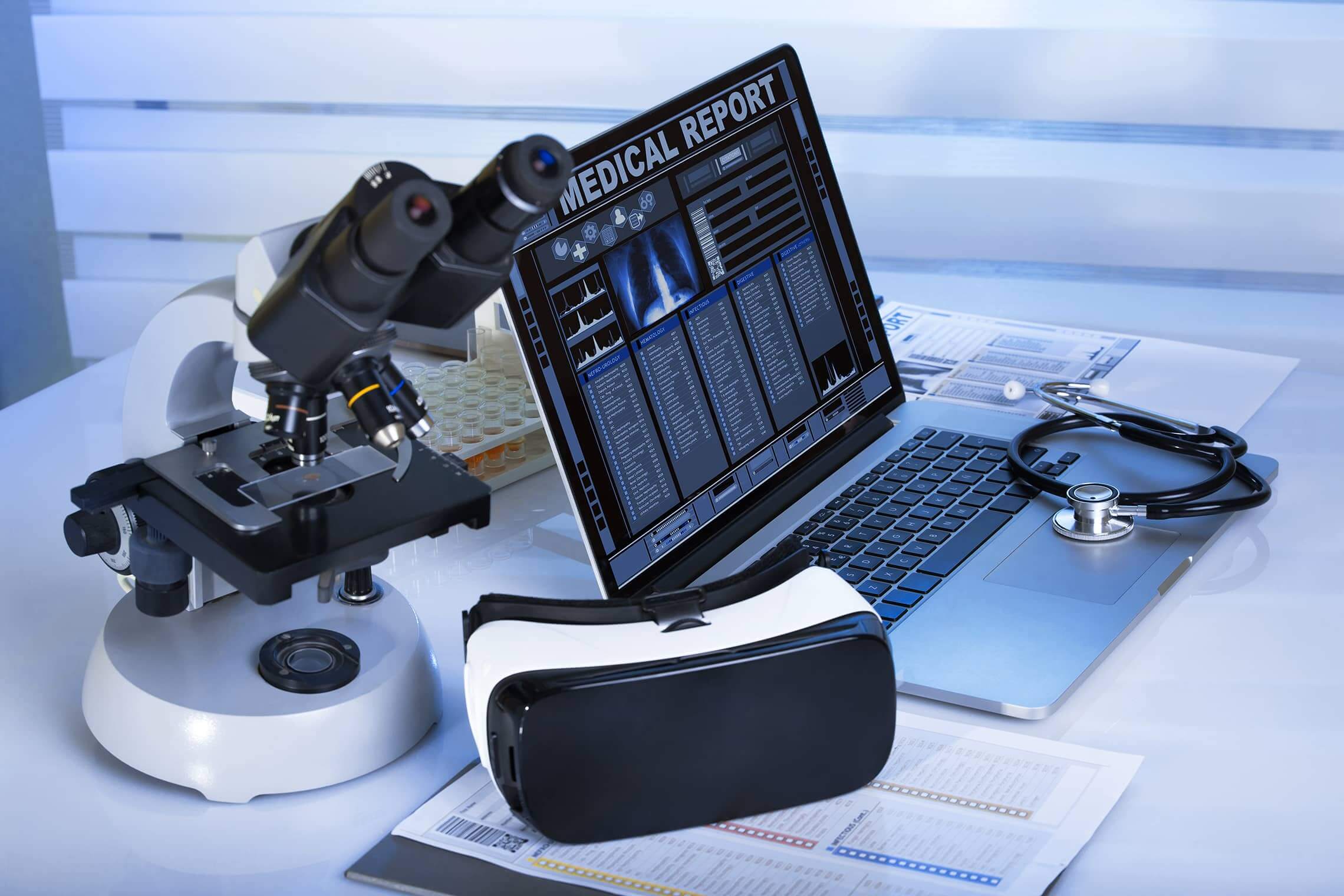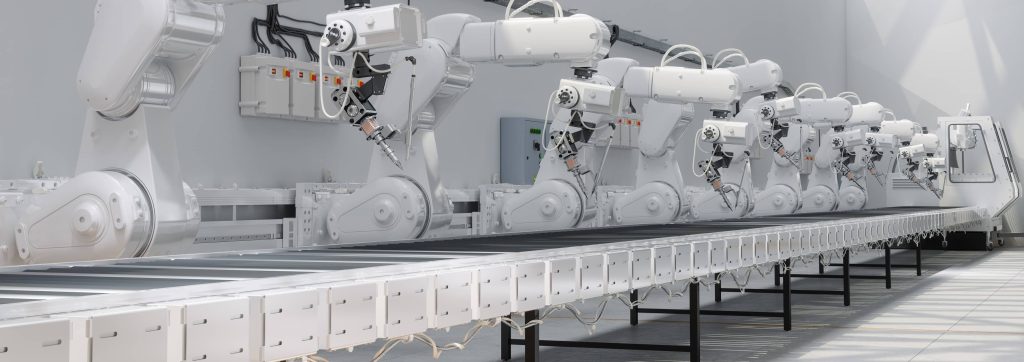
According to a recent Deloitte's healthcare technology trends review, “2021 could be an important transition year for the health sector and an opportunity for investors”. The general consensus among those wanting to put their money into healthtech is that the entrepreneurs worth backing are the ones which are looking to make healthcare more “effective, affordable, and consumer-friendly”. This will lead to a surge in investment for technologies including telemedicine, blockchain, connected devices and AI—among others—over the coming years.
Technology has played a pivotal role in the healthcare industry over the decades and, in 2020, the emergence of the global pandemic brought with it a fundamental shift in how practitioners and patients were able to engage with healthcare services. The need to maintain social distancing expedited a move towards digital that was already gaining momentum and, now, there may be no going back to the traditional doctors’ office as we know it. We've reviewed the vast arsenal of healthcare technology tools to help healthcare providers enable better outcomes at lower costs.
1. Data science, AI, deep learning and machine learning
Healthcare generates enormous quantities of data. There’s little debate that there is a tremendous insight to be mined from this vast data lake – leading to improved patient outcomes. Data science is likely to be critical in alleviating the COVID-19 crisis, informing everything from treatment options through to the pace at which normal social interactions can be resumed.
Today’s data science capabilities, including predictive analytics and AI sciences such as machine learning, draw much deeper insight, much faster. We think 2021 will continue to see dramatic advances in the way data science contributes to healthcare outcomes. For example, Microsoft uses machine learning to distinguish between healthy tissue and tumours, with Project InnerEye using AI to help medical experts with surgical and radiotherapy planning.
Indeed, through 2021 we expect data science to continue to prove essential to addressing the three critical challenges of healthcare. Data science will help assess risks and assist healthcare providers in triaging and the planning of care. Population data will drive deeper insight into public health issues and will help many government software solutions and healthcare providers put in place strong, preventative measures.
AI is arguably one of the most critical digital transformation technologies and its potential for the healthcare sector is vast. AI approaches will continue to improve diagnosis, provide novel treatment options, and give physicians better guidance towards treatment and prescription decisions.
If we consider the past year alone, AI, machine learning and deep learning have played a fundamental role in helping governments and medical institutions deal with the COVID-19 crisis. This technology has helped organisations harness predictive modelling and deep analytics to investigate global datasets linked with slowing the spread, including:
- Insect and animal populations
- Climatic conditions
- Health systems’ capacity
- Worldwide travel data
- Vaccine development and efficacy
Post-pandemic, the applications of artificial intelligence for healthcare will include clinical research/trials and treatment customisation; supporting the integration of electronic health record (EHR) data with telemedicine apps; early detection of diseases such as cancer and Altzheimer’s; proactive personal health management; and rethinking end of life care with AI-powered robotics. Machine learning and chatbot technology will also become increasingly important in assisting both practitioners and patients in performing diagnosis.
2. Big Data and predictive analytics
The healthcare sector generates a vast amount of medical data, ranging from diagnosis and imaging data to data collected through wearables that monitor fitness and activity levels. Remote patient monitoring technologies (RPM) can now allow healthcare providers to access real-time data on key health markers including weight, heart rate, blood pressure, and blood sugar levels. This heralds a shift towards preventative diagnosis and intervention which should halt serious chronic conditions in their path.
What’s more, these technologies will allow medical institutions to gain an accurate “big picture” of a patient's health status, by consolidating data from all of the various medical, insurance and individual settings. This, in turn, will lead to far better patient outcomes at a lower cost.
Over the coming years, we’re likely to see big data and predictive analytics used in applications including:
- precision medicine and research - moving away from the current “trial-and-error” treatment model
- real-time infection control - through the instant analysis of vast global datasets
- facilitating preventative care - flagging repeat patients and enabling preemptive plans to be put in place
- accurate staffing, workflow optimisation and medical cost reduction
- incorporating data from medical devices
3. Biotechnology, genomics and gene editing
In 2020, the Crispr-Cas9 gene-editing tool won the Nobel prize for chemistry—hailed as the “molecular scissors” that would allow scientists to “rewrite the book of life”. With it, scientists hope to be able to cure many of the common diseases that have afflicted humanity for centuries, including heart conditions, cancer, diabetes and age-related diseases such as Alzheimer’s.
According to Fior Markets, the global genome editing market is set to reach $17.5 billion USD by 2028, so it’s certainly a trend that investors are rallying behind. What we’re likely to see, over the next decade or so, is genomics enabling huge advances in precision medicine—with drug treatments tailored to the exact genetic makeup of the individual patient. This, in turn, will yield big wins in terms of treatment efficiency and cost savings, while potentially preventing a great many unnecessary deaths.

4. Robotic process automation
Robotic process automation (RPA) and other automation tools are growing in prominence, with KPMG predicting a USD 5bn market in 2020. As one of the top healthcare technology trends, RPA can help enable greater productivity at lower costs.
We know that RPA can deliver quick wins for time-pressured staff – and staff pressure is a common issue in healthcare. For example, a single medical incident can trigger a complex patchwork of insurance claims with seemingly endless paperwork. RPA speeds up the process automating tedious, manual insurance tasks to dramatically improve claim efficiency – reducing the cost base for providers.
While automation can significantly increase productivity in the healthcare field, RPA instances can also introduce additional security vulnerabilities. Check out this whitepaper addressing the top 10 security risks in robotic process automation.
In the broad, automated approaches to healthcare processes act in a similar way to automation in any other industry setting. Automation reduces manual steps, wastage, and errors. In an era where there is unprecedented pressure on healthcare systems around the globe, automation is set to provide marked relief – throughout 2021.
5. Telemedicine, on-demand healthcare and virtual healthcare
While innovations within the telehealth market have been expedited by COVID-19, it’s a trend that’s set to stay. Beyond the pandemic, telehealth software can bring healthcare services to those in remote locations, or those who are cut-off from accessing medical services for other reasons, such as mobility issues.
Successful telemedicine delivery is multifaceted, encompassing various different technological solutions including:
- Apps and wearables
- Integrated EHR
- Interactive Voice Response (IVR) solutions
- Natural language processing
- Cloud-based solutions
- Open-source WebRTC
A shift towards remote care provision is likely to see individuals taking their health and wellbeing into their own hands more than ever before, particularly where wearable tech is concerned. The combination of personal monitoring devices and telemedicine apps with integrated electronic health records will give patients more visibility over their own health and prompt lifestyle changes which could stop chronic diseases, such as diabetes and heart conditions, before they ever have a chance to take hold.
Humans are at the core of the healthcare industry. While technology is often about the technical and the procedural, technology also has a human face. In healthcare, the human face of technology can be as powerful as data science and AI in delivering improved outcomes.
Virtual healthcare is one example – and a very poignant example in 2021. First, given cost pressures in the health system, it’s hard to ignore the cost-saving benefit of virtual healthcare. However, virtual healthcare is also about access and that’s perhaps the most important aspect in 2021, and beyond – when healthcare provisioning often must be performed at distance.
For example, digital twin technology is quickly emerging as a way to enable highly targeted care, allowing to prevent and treat health conditions efficiently. Digital twins can deliver tangible benefits by emulating health conditions. Researchers can use data from patient-worn sensors, like Apple Watch or Fitbit, to create a digital twin which is essentially a "backup of a patient's physical state" before a treatment procedure.
Then there’s the simple interaction layer. Humans must interact with healthcare providers on a regular basis, but with time-pressured, loaded staff, healthcare providers are sometimes not able to provide primary healthcare consulting in a timely, well-organized and cost-effective manner.
According to the Harvard Business Review, tech-driven cost benefits could amount to USD 10bn annually across the U.S. healthcare system.
Chatbots and voice technology can support patients in a variety of ways, from assisting with the booking process to guiding them through assessments, recognising and analysing symptoms through chat conversions. Data collected by chatbots can help doctors to save extra time as well as assist in decision-making concerning treatment procedures and care.
The past twelve months have seen people’s schedules shaken up beyond recognition, with parents juggling both work and home-schooling responsibilities, and individuals far less likely to be commuting into the office during the week. This has given rise to a greater desire for on-demand services which, even before the pandemic, were becoming the norm.
The rise of digital within the healthcare sector means that patients have grown used to going online to research doctors and facilities, as well as booking appointments and accessing their own patient files.
Moving forwards, we’ll see more and more innovative companies linking doctors with practices on a remote or freelance basis and, as a result, more patients will be able to access remote appointments and advice at a time and place that suits them. What’s more, this flexible approach to care provision will enable physicians with the most appropriate expertise to be connected with the patients they can deliver the best care for.
6. Virtual and Augmented Reality
VR and AR technologies hold great promise for the healthcare industry and the market is predicted to be worth $5.1 billion by 2025. Where, previously, it would have been unheard of to treat chronic pain using virtual reality, now, that concept is becoming very real. Furthermore, the technology has found applications in the treatment of anxiety and stress disorders—even stroke treatment.
Key applications for VR and MR within healthcare include:
- providing training simulations for medical students - including overlays and quick data comparison to enable swifter diagnosis
- physical trauma aftercare
- pain distraction during surgery
- treatment of dementia and cognitive diseases
- controlled simulations that help therapists tailor care plans for their patients

7. Cybersecurity and data protection
In 2020, hackers carried out ransomware attacks on six U.S. hospitals within 24 hours, shutting down IT systems and slowing operations—not only in these hospitals but in others across the country, which felt compelled to block external emails while assessing their own vulnerabilities.
As more healthcare services go online and more patient data is stored digitally, the importance of a robust cybersecurity solution becomes increasingly urgent.
Some of the key considerations for healthcare organisations are HIPAA compliance, with remote doctor call-outs adding a potential vulnerability to patient data confidentiality, and the need for healthcare IT teams to establish solid communication and processes around organisation-wide data handling. Currently, not all telemedicine technologies comply with HIPAA requirements, which poses a potential threat to privacy.
8. Blockchain and IPFS networks
Blockchain is considered one of the most promising healthcare technology trends. The healthcare blockchain market is expected to reach $890.5 million by 2023, according to a recent report. Blockchain business solutions have become increasingly significant across a breadth of industries in recent years, and its potential for the medical sector is huge. Used in conjunction with technologies like IoMT and cloud computing, blockchain can progress a number of important healthcare initiatives.
One of the key areas in which blockchain can add value is patient data security. Because of the use of digital ledgers, transaction records can be safely transmitted between care providers and patients, while the peer-to-peer nature of the system means that many users can access the ledger at the same time, without compromising security. It can help safeguard against data breaches, improve the overall accuracy of patient data records and reduce cost burdens across healthcare settings.
9. The Internet of Medical Things (IoMT)
The IoT is already a familiar term for most people, but the Internet of Medical Things (IoMT) only recently entered the list of the top healthcare technology trends and may be less a part of our lexicon. Even so, TechJury predicts that the sector will be worth $6.2 trillion by 2025. Just in terms of the reaction to COVID-19, the IoMT is being used to track illness and stop the spread through:
- vaccine development
- thermal screening
- facial recognition with masks
- analysing CT scans
Moving forward, the IoMT will be used to help practitioners keep track of chronic illnesses and take preemptive steps to prevent diseases developing in the first place. Being one of the most promising healthcare technology trends that offers a new direction in caregiving, it will be facilitated through technologies that enable remote patient monitoring, like wearables including ECG & EKG monitors, and other intelligent devices and sensors which track common health markers such as temperature, blood pressure and blood sugar.
10. Cloud storage for electronic health record (EHR) systems
Within the healthcare sector, EHR systems are increasingly being deployed to help combat the time and money constraints of the traditional paper-based approach.
With cloud-based data storage, the goal of making healthcare more mobile and accessible can be realised, however, there are still some concerns around data safety which need to be ironed out. Compliance with HIPAA regulations is the main issue, with rules around the safety of Protected Health Information (ePHI) extremely robust. Currently, meeting compliance is tough and work still needs to be done to ensure that this new wealth of accessible patient data is used for the greater good, rather than falling into the wrong hands.

Harnessing the multi-stranded power of healthcare technology trends
Healthcare is undoubtedly in the midst of a technological revolution. The healthcare technology trends we mentioned are going to have a revolutionary impact on the sector in the nearest future. Never before have we had the ability to predict diseases and fully tailor a treatment approach for the best possible patient outcomes. But this new abundance of patient data poses some real challenges around privacy. Once these concerns are addressed, innovations within the market are sure to progress in leaps and bounds.
Voice enablement, digital twins, RPA, automation, machine learning, AI, data science, blockchain… healthcare technology is a broad and complex field. How can healthcare providers navigate the vast arsenal of healthcare technology tools during what is perhaps one of the most disruptive years in recent memory? Engaging with a technology partner that has deep expertise across the entire information technology field is a good start.
At ELEKS, we have years of experience helping transform the healthcare sector. Moreover, we’ve developed our own healthcare solution for unified clinical data management and process automation. It gives us insight and skills to empower every aspect of your healthcare business.
Get in touch with us to see how we can help your organisation stay ahead of 2020's healthcare technology trends.
Related Insights










